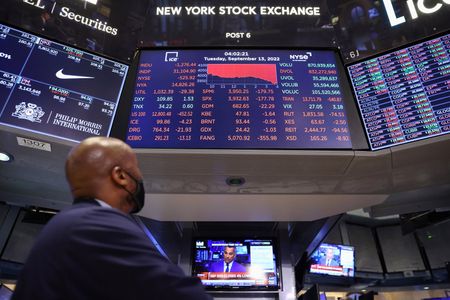LONDON (Reuters) -Investors turned more optimistic about the global economy in February, flocking to emerging market stocks and cutting their cash holdings to levels last seen since before the war in Ukraine, a BofA survey of global investors showed on Tuesday.
The survey of 299 fund managers, with a combined $847 billion in assets under management, found investors were still broadly cautious, but less so than been in recent months. Just 24% predict a recession compared to 77% who did in November, according to the survey conducted in the week to Feb. 9.
Investors remain net overweight cash and underweight equities, but a combined index that measures growth expectations, cash allocations and equity allocations improved to its highest level in a year.
The survey reflects a broad sweep higher in share prices. MSCI’s all country world index <.MIWD00000PUS> hit a nine-month high on Feb. 2, though has since softened a little.
Those moves, said analysts, were largely driven by hopes that major economies would avoid a recession, while inflation would continue to fall, particularly in the U.S. allowing the Federal Reserve to be less aggressive when it comes to monetary policy.
“(Fund manager survey) investors remain pessimistic in February but to a lesser degree, with all key measures of sentiment improving (month on month) and shift in positioning highlighting stronger risk appetite,” BofA analysts said in a note.
The survey found the percentage of investors who are overweight emerging market equities increased by 51 percentage points from November 2022 to February, marking the largest three-month increase on record.
It also found that “long China stocks” was now the most crowded trade along with long investment grade bonds, replacing long US dollar cash.
China abruptly scrapped many of its restrictions on life and travel aimed at curbing the spread of COVID-19 late last year, sending Hong Kong’s benchmark Hang Seng Index to an 11-month top in late January.
BofA noted however, that while investors were the least pessimistic since February last year, positioning was not optimistic enough to be a catalyst to sell.
Extreme positioning in an asset is often seen as a negative, as it suggests there are comparatively few investors left to buy and plenty who could decide to sell.
(Reporting by Alun John; Editing by Amanda Cooper and Mike Harrison)

